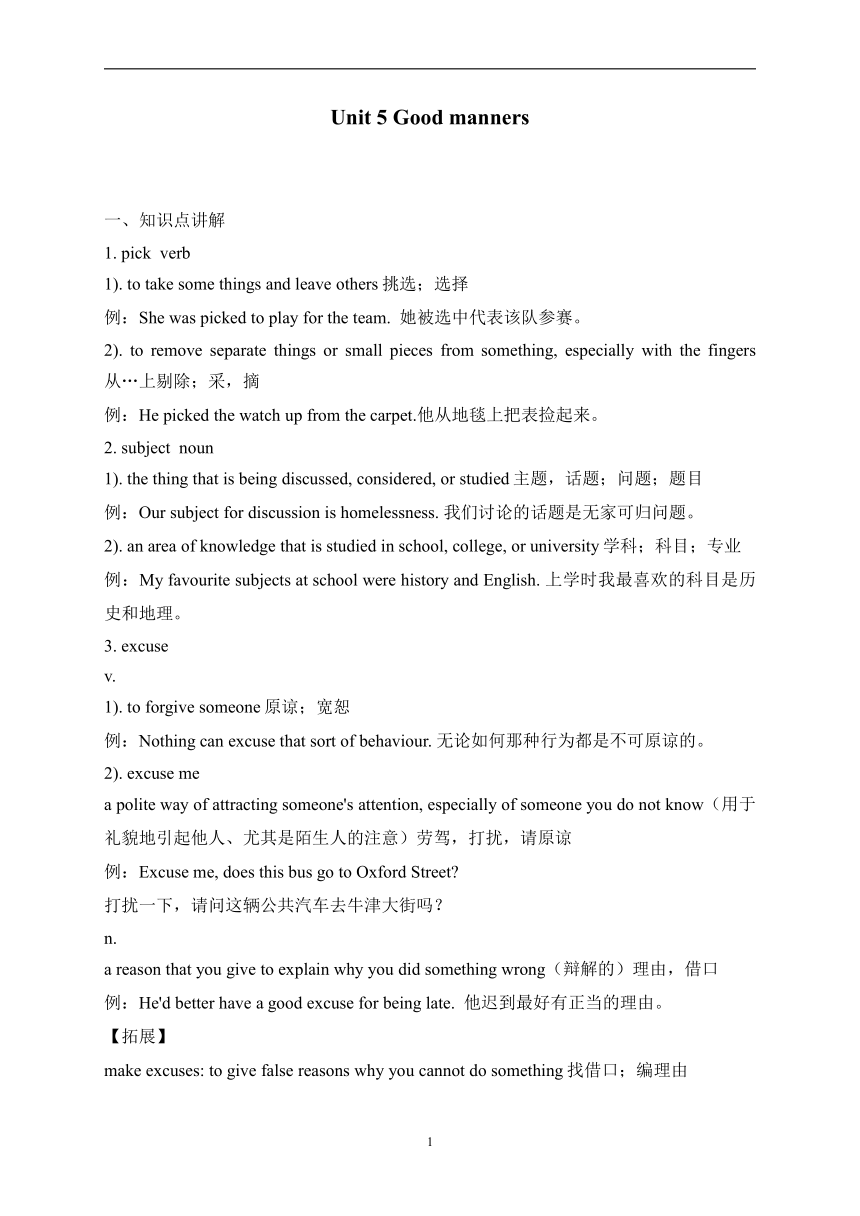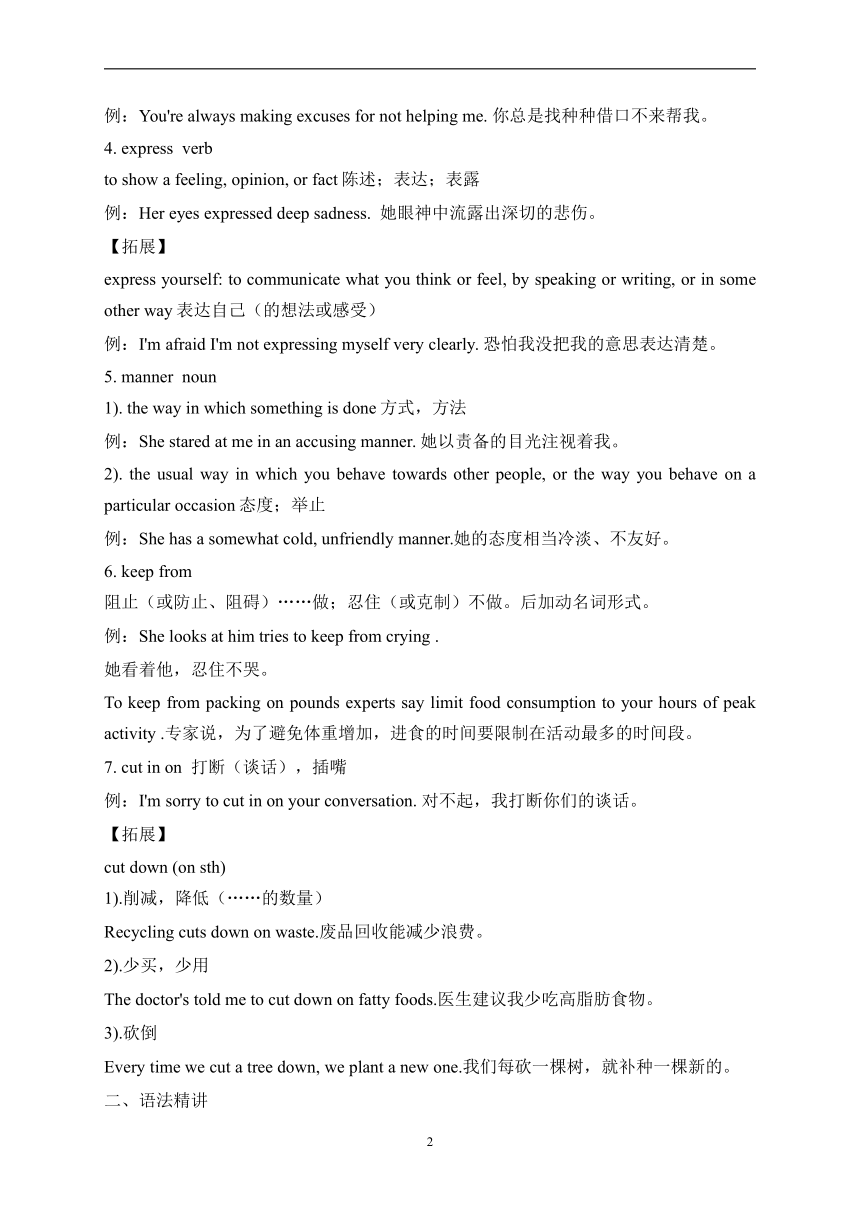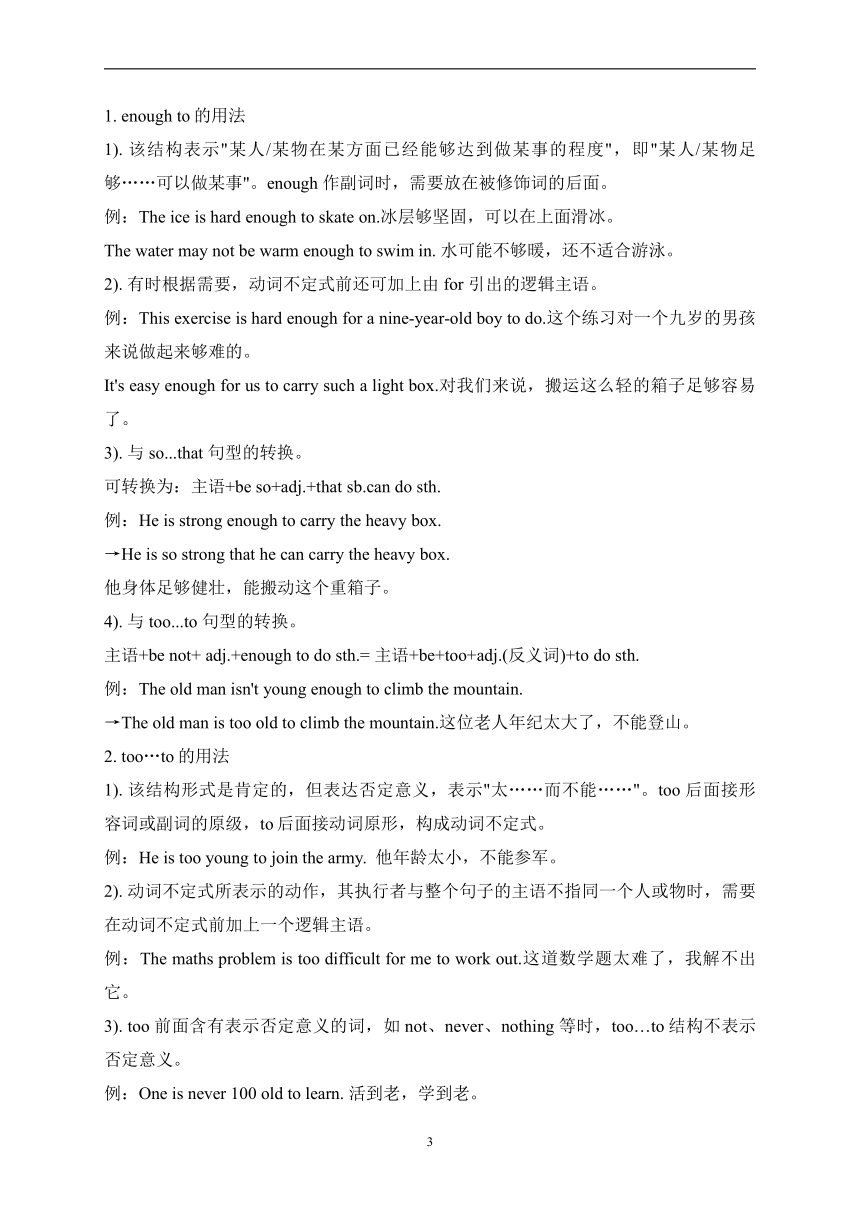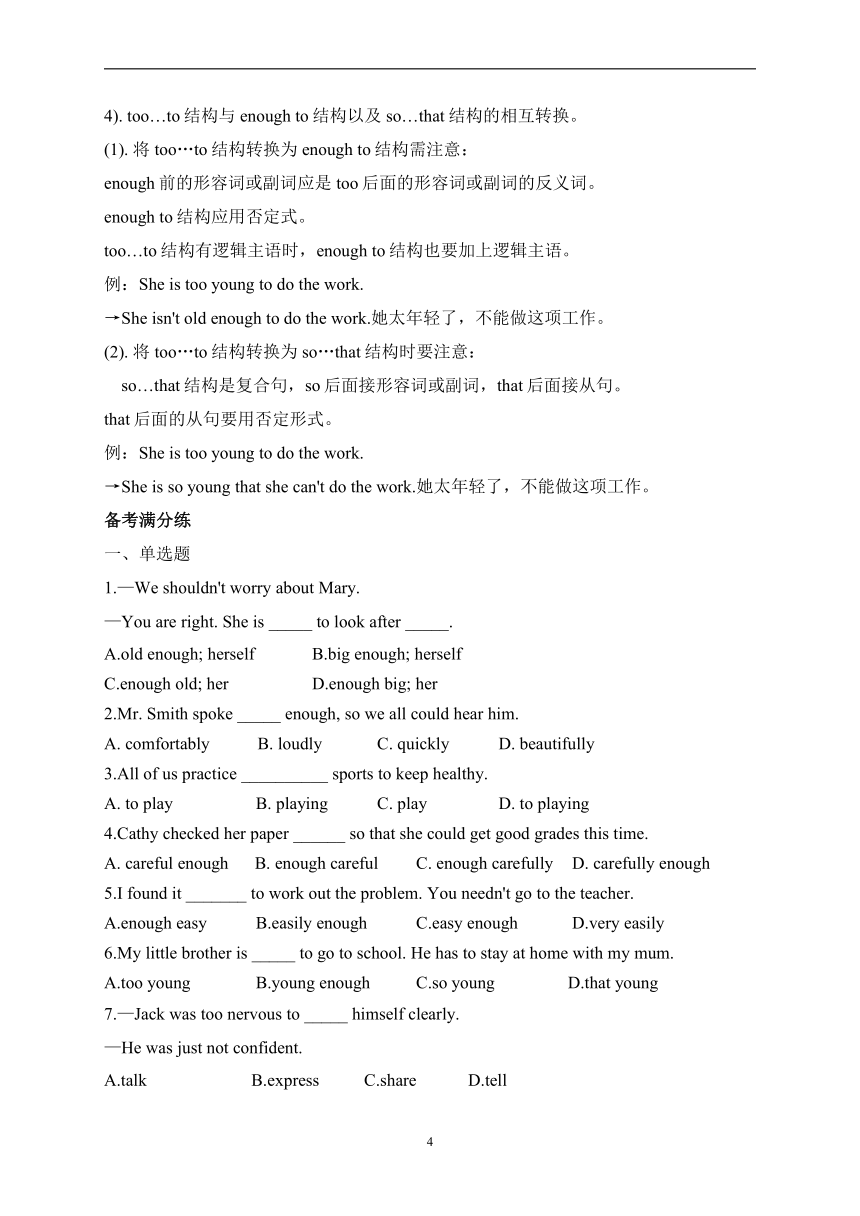Unit 5 Good manners——2022-2023学年牛津译林版英语八年级下学期期末复习备考攻略(含解析)
文档属性
| 名称 | Unit 5 Good manners——2022-2023学年牛津译林版英语八年级下学期期末复习备考攻略(含解析) |  | |
| 格式 | docx | ||
| 文件大小 | 31.2KB | ||
| 资源类型 | 教案 | ||
| 版本资源 | 牛津译林版 | ||
| 科目 | 英语 | ||
| 更新时间 | 2023-06-18 16:19:34 | ||
图片预览




文档简介
Unit 5 Good manners
一、知识点讲解
1. pick verb
1). to take some things and leave others挑选;选择
例:She was picked to play for the team. 她被选中代表该队参赛。
2). to remove separate things or small pieces from something, especially with the fingers从…上剔除;采,摘
例:He picked the watch up from the carpet.他从地毯上把表捡起来。
2. subject noun
1). the thing that is being discussed, considered, or studied主题,话题;问题;题目
例:Our subject for discussion is homelessness. 我们讨论的话题是无家可归问题。
2). an area of knowledge that is studied in school, college, or university学科;科目;专业
例:My favourite subjects at school were history and English. 上学时我最喜欢的科目是历史和地理。
3. excuse
v.
1). to forgive someone原谅;宽恕
例:Nothing can excuse that sort of behaviour. 无论如何那种行为都是不可原谅的。
2). excuse me
a polite way of attracting someone's attention, especially of someone you do not know(用于礼貌地引起他人、尤其是陌生人的注意)劳驾,打扰,请原谅
例:Excuse me, does this bus go to Oxford Street
打扰一下,请问这辆公共汽车去牛津大街吗?
n.
a reason that you give to explain why you did something wrong(辩解的)理由,借口
例:He'd better have a good excuse for being late. 他迟到最好有正当的理由。
【拓展】
make excuses: to give false reasons why you cannot do something找借口;编理由
例:You're always making excuses for not helping me. 你总是找种种借口不来帮我。
4. express verb
to show a feeling, opinion, or fact陈述;表达;表露
例:Her eyes expressed deep sadness. 她眼神中流露出深切的悲伤。
【拓展】
express yourself: to communicate what you think or feel, by speaking or writing, or in some other way表达自己(的想法或感受)
例:I'm afraid I'm not expressing myself very clearly. 恐怕我没把我的意思表达清楚。
5. manner noun
1). the way in which something is done方式,方法
例:She stared at me in an accusing manner. 她以责备的目光注视着我。
2). the usual way in which you behave towards other people, or the way you behave on a particular occasion态度;举止
例:She has a somewhat cold, unfriendly manner.她的态度相当冷淡、不友好。
6. keep from
阻止(或防止、阻碍)……做;忍住(或克制)不做。后加动名词形式。
例:She looks at him tries to keep from crying .
她看着他,忍住不哭。
To keep from packing on pounds experts say limit food consumption to your hours of peak activity .专家说,为了避免体重增加,进食的时间要限制在活动最多的时间段。
7. cut in on 打断(谈话),插嘴
例:I'm sorry to cut in on your conversation. 对不起,我打断你们的谈话。
【拓展】
cut down (on sth)
1).削减,降低(……的数量)
Recycling cuts down on waste.废品回收能减少浪费。
2).少买,少用
The doctor's told me to cut down on fatty foods.医生建议我少吃高脂肪食物。
3).砍倒
Every time we cut a tree down, we plant a new one.我们每砍一棵树,就补种一棵新的。
二、语法精讲
1. enough to的用法
1). 该结构表示"某人/某物在某方面已经能够达到做某事的程度",即"某人/某物足够……可以做某事"。enough 作副词时,需要放在被修饰词的后面。
例:The ice is hard enough to skate on.冰层够坚固,可以在上面滑冰。
The water may not be warm enough to swim in. 水可能不够暖,还不适合游泳。
2). 有时根据需要,动词不定式前还可加上由for 引出的逻辑主语。
例:This exercise is hard enough for a nine-year-old boy to do.这个练习对一个九岁的男孩来说做起来够难的。
It's easy enough for us to carry such a light box.对我们来说,搬运这么轻的箱子足够容易了。
3). 与so...that 句型的转换。
可转换为:主语+be so+adj.+that sb.can do sth.
例:He is strong enough to carry the heavy box.
→He is so strong that he can carry the heavy box.
他身体足够健壮,能搬动这个重箱子。
4). 与too...to 句型的转换。
主语+be not+ adj.+enough to do sth.= 主语+be+too+adj.(反义词)+to do sth.
例:The old man isn't young enough to climb the mountain.
→The old man is too old to climb the mountain.这位老人年纪太大了,不能登山。
2. too…to的用法
1). 该结构形式是肯定的,但表达否定意义,表示"太……而不能……"。too 后面接形容词或副词的原级,to后面接动词原形,构成动词不定式。
例:He is too young to join the army. 他年龄太小,不能参军。
2). 动词不定式所表示的动作,其执行者与整个句子的主语不指同一个人或物时,需要在动词不定式前加上一个逻辑主语。
例:The maths problem is too difficult for me to work out.这道数学题太难了,我解不出它。
3). too 前面含有表示否定意义的词,如not、never、nothing 等时,too…to结构不表示否定意义。
例:One is never 100 old to learn. 活到老,学到老。
4). too…to结构与enough to结构以及so…that结构的相互转换。
(1). 将too…to结构转换为enough to结构需注意:
enough前的形容词或副词应是too后面的形容词或副词的反义词。
enough to结构应用否定式。
too…to结构有逻辑主语时,enough to结构也要加上逻辑主语。
例:She is too young to do the work.
→She isn't old enough to do the work.她太年轻了,不能做这项工作。
(2). 将too…to结构转换为so…that结构时要注意:
so…that结构是复合句,so后面接形容词或副词,that后面接从句。
that后面的从句要用否定形式。
例:She is too young to do the work.
→She is so young that she can't do the work.她太年轻了,不能做这项工作。
备考满分练
一、单选题
1.—We shouldn't worry about Mary.
—You are right. She is _____ to look after _____.
A.old enough; herself B.big enough; herself
C.enough old; her D.enough big; her
2.Mr. Smith spoke _____ enough, so we all could hear him.
A. comfortably B. loudly C. quickly D. beautifully
3.All of us practice __________ sports to keep healthy.
A. to play B. playing C. play D. to playing
4.Cathy checked her paper ______ so that she could get good grades this time.
A. careful enough B. enough careful C. enough carefully D. carefully enough
5.I found it _______ to work out the problem. You needn't go to the teacher.
A.enough easy B.easily enough C.easy enough D.very easily
6.My little brother is _____ to go to school. He has to stay at home with my mum.
A.too young B.young enough C.so young D.that young
7.—Jack was too nervous to _____ himself clearly.
—He was just not confident.
A.talk B.express C.share D.tell
8.Daniel was behind the tree ________ a snowball hit him.
A. when B. while C. as D. after
9.The police ________ stopped some people from selling dinosaur eggs.
A. success B. succeed C. successful D. successfully
10.—Yesterday my father bought me a new mobile phone as a present, but I don’t know how to use it.
—Why not read the ________ first before using it
A. conclusions B. conditions C. suggestions D. instructions
二、填空题
11.My mother often w_________ me not to watch cellphones too much or my eyes will become weak.
12.The question is a little difficult. Let's have a _____(discuss) about it.
13.Please don't make too much noise while _____(read) books in the library.
14.The purpose of the talk is _____(make) students understand their parents better.
15.It is a _____(success) talent show because many people like it very much.
三、阅读理解
Living in a foreign culture can be exciting, but it can also be confusing (令人迷惑的). A group of Americans who taught English in other countries recently discussed their experiences. They decided that miscommunications were always possible, even over something as simple as"yes" and "no".
On her first day in Micronesia, an island in the Pacific, Lisa thought people weren't paying any attention to her. The day was hot. She went into a store and asked, "Do you have cold drinks " The woman there didn’t say anything. Lisa repeated the question. Still the woman said nothing. She later learned that the woman had answered her: She had raised her eyebrows (眉毛), which in Micronesia means "yes".
Jan remembered an experience she had in Bulgaria, a country in Europe. She went to a restaurant that was known for its cabbage. She asked the waiter, "Do you have cabbage today " He nodded his head. Jan waited, but the cabbage never came. In that country, a nod means no.
Tom had a similar problem when he arrived in India. After explaining something in class, he asked his students if they understood. They answered with many different nods and shakes of the head. He thought some people had not understood, so he explained again. When he asked again, they did the same thing. He soon found out that his students did understand. In India, people nod and shake their heads in different ways depending on where they come from. You have to know where a person is from to understand whether they mean "yes" or "no".
1. These Americans teaching English in other countries found that they ________.
A. should go abroad for vacations
B. needed to learn foreign languages
C. should often discuss their experiences
D. had problems with communications
2. Tom misunderstood his class at first because ________.
A. he did not know much about Indian culture
B. he didn't explain everything clearly enough
C. some students didn't understand his questions
D. he didn't know where the students came from
3. Which of the following is TRUE according to this passage
A. In Bulgaria, nodding heads means no.
B. Jan taught English on a Pacific island.
C. Lisa was trying to buy some cabbage.
D. In India, only shaking heads means "YES".
4. The passage is mainly about ________.
A. body language in foreign restaurants
B. class discussion in Indian schools
C. miscommunication in different cultures
D. English teaching in other countries
答案以及解析
1.答案:A
解析:考查反身代词。句意: —我们不应该担心玛丽。—你说得对。她已经足够大了, 能照顾自己了。enough修饰形容词需要放在形容词的后面,故排除C和D。这里的足够大指的是年龄大,应该用old, 故排除B。herself是反身代词, 指她自己。故选A。
2.答案:B
解析:考查副词辨析。句意:史密斯先生说话的声音很大,所以我们都能听到他的声音。comfortably舒服地 ;loudly大声地;quickly快速地;beautifully漂亮地。根据"so we all could hear him."可知,史密斯先生说话的声音应该很大。故选B。
3.答案:B
解析:考查非谓语动词。句意:我们所有人练习做运动来保持健康。根据句式"practice doing sth练习做某事"可知,空处用动名词作宾语。故选B。
4.答案:D
解析:句意: 凯西足够认真地检查了她的试卷, 以便她这次能取得好成绩。修饰动词短语"checked her paper"需要用副词carefully, 而enough通常放在被修饰的副词之后。 故选D。
5.答案:C
解析:考查形容词和enough的位置。句意:我发现解决这个问题很容易。你不必去找老师。"find it+adj. to do sth."为固定搭配,意为"发现做某事是……",其中it作形式宾语, 真正的宾语是后面的动词不定式,形容词此处用作宾语补足语, B、D选项可排除。根据英语语法, enough作副词修饰形容词或副词时, 必须放在要修饰的形容词或副词之后。故选C。
6.答案:A
解析:考查固定短语。句意:我弟弟太小了, 不能上学。他不得不和我妈妈待在家里。too...to...太……而不能……。故选A。
7.答案:B
解析:考查动词辨析。句意: —杰克紧张得不能清楚地表达自己。—他只是不自信。A.交谈;B.表达; C.分享;D.讲述。根据空前的"Jack was too nervous to"与空后的clearly可知,此空是"表达"的意思。故选B。
8.答案:A
解析:考查连词辨析。句意:丹尼尔正在树后,这时一个雪球击中了他。when当……时候、这时,可表示一个时间点也可表示一个时间段(动词是延续性和非延续性的);while当……时候,表示一个时间段,动词是延续性的;as当……时候,强调动作的延续性;after在……之后。根据空后动词hit是非延续性动词,表示一个时间点可知,空处连词应用when。故选A。
9.答案:D
解析:考查副词用法。句意:警察成功地阻止了一些人出售恐龙蛋。succes名词;succeed动词;successful形容词;successfully副词。分析句子可知,空格处是缺副词修饰动词stopped。故选D。
10.答案:D
解析:考查名词辨析。句意:——昨天我父亲给我买了一部新手机作为礼物,但是我不知道如何使用它。——为什么不在使用之前先读说明书呢?conclusions结果;conditions条件;suggestions建议;instructions说明,说明书。根据"but I don't know how to use it."可知,他不知道如何使用新手机,应在使用它之前看一下说明书。故选D。
二、填空题
11.答案:(w)arns
12.答案:discussion
13.答案:reading
14.答案:to make
15.答案:successful
三、阅读理解
答案:1-4 DAAC
解析:1.细节理解题。根据"They decided that miscommunications were always possible, even over something as simple as 'yes' and 'no'."可知这些在其他国家教英语的美国人发现他们在交流方面有问题。故选D。
2.细节理解题。根据"In India, people nod and shake their heads in different ways depending on where they come from."可知,汤姆起初误解了他的学生是因为他对印度文化了解不多。故选A。
3.细节理解题。根据"Jan remembered an experience she had in Bulgaria, a country in Europe. She went to a restaurant that was known for its cabbage. She asked the waiter, 'Do you have cabbage today ' He nodded his head. Jan waited, but the cabbage never came. In that country, a nod means no."可知,在保加利亚,点头表示不。故选A。
4.主旨大意题。本文主要告诉我们不同国家有不同的语言文化,不同的风俗习惯,这可能会带来一些问题和困惑。故选C。
2
一、知识点讲解
1. pick verb
1). to take some things and leave others挑选;选择
例:She was picked to play for the team. 她被选中代表该队参赛。
2). to remove separate things or small pieces from something, especially with the fingers从…上剔除;采,摘
例:He picked the watch up from the carpet.他从地毯上把表捡起来。
2. subject noun
1). the thing that is being discussed, considered, or studied主题,话题;问题;题目
例:Our subject for discussion is homelessness. 我们讨论的话题是无家可归问题。
2). an area of knowledge that is studied in school, college, or university学科;科目;专业
例:My favourite subjects at school were history and English. 上学时我最喜欢的科目是历史和地理。
3. excuse
v.
1). to forgive someone原谅;宽恕
例:Nothing can excuse that sort of behaviour. 无论如何那种行为都是不可原谅的。
2). excuse me
a polite way of attracting someone's attention, especially of someone you do not know(用于礼貌地引起他人、尤其是陌生人的注意)劳驾,打扰,请原谅
例:Excuse me, does this bus go to Oxford Street
打扰一下,请问这辆公共汽车去牛津大街吗?
n.
a reason that you give to explain why you did something wrong(辩解的)理由,借口
例:He'd better have a good excuse for being late. 他迟到最好有正当的理由。
【拓展】
make excuses: to give false reasons why you cannot do something找借口;编理由
例:You're always making excuses for not helping me. 你总是找种种借口不来帮我。
4. express verb
to show a feeling, opinion, or fact陈述;表达;表露
例:Her eyes expressed deep sadness. 她眼神中流露出深切的悲伤。
【拓展】
express yourself: to communicate what you think or feel, by speaking or writing, or in some other way表达自己(的想法或感受)
例:I'm afraid I'm not expressing myself very clearly. 恐怕我没把我的意思表达清楚。
5. manner noun
1). the way in which something is done方式,方法
例:She stared at me in an accusing manner. 她以责备的目光注视着我。
2). the usual way in which you behave towards other people, or the way you behave on a particular occasion态度;举止
例:She has a somewhat cold, unfriendly manner.她的态度相当冷淡、不友好。
6. keep from
阻止(或防止、阻碍)……做;忍住(或克制)不做。后加动名词形式。
例:She looks at him tries to keep from crying .
她看着他,忍住不哭。
To keep from packing on pounds experts say limit food consumption to your hours of peak activity .专家说,为了避免体重增加,进食的时间要限制在活动最多的时间段。
7. cut in on 打断(谈话),插嘴
例:I'm sorry to cut in on your conversation. 对不起,我打断你们的谈话。
【拓展】
cut down (on sth)
1).削减,降低(……的数量)
Recycling cuts down on waste.废品回收能减少浪费。
2).少买,少用
The doctor's told me to cut down on fatty foods.医生建议我少吃高脂肪食物。
3).砍倒
Every time we cut a tree down, we plant a new one.我们每砍一棵树,就补种一棵新的。
二、语法精讲
1. enough to的用法
1). 该结构表示"某人/某物在某方面已经能够达到做某事的程度",即"某人/某物足够……可以做某事"。enough 作副词时,需要放在被修饰词的后面。
例:The ice is hard enough to skate on.冰层够坚固,可以在上面滑冰。
The water may not be warm enough to swim in. 水可能不够暖,还不适合游泳。
2). 有时根据需要,动词不定式前还可加上由for 引出的逻辑主语。
例:This exercise is hard enough for a nine-year-old boy to do.这个练习对一个九岁的男孩来说做起来够难的。
It's easy enough for us to carry such a light box.对我们来说,搬运这么轻的箱子足够容易了。
3). 与so...that 句型的转换。
可转换为:主语+be so+adj.+that sb.can do sth.
例:He is strong enough to carry the heavy box.
→He is so strong that he can carry the heavy box.
他身体足够健壮,能搬动这个重箱子。
4). 与too...to 句型的转换。
主语+be not+ adj.+enough to do sth.= 主语+be+too+adj.(反义词)+to do sth.
例:The old man isn't young enough to climb the mountain.
→The old man is too old to climb the mountain.这位老人年纪太大了,不能登山。
2. too…to的用法
1). 该结构形式是肯定的,但表达否定意义,表示"太……而不能……"。too 后面接形容词或副词的原级,to后面接动词原形,构成动词不定式。
例:He is too young to join the army. 他年龄太小,不能参军。
2). 动词不定式所表示的动作,其执行者与整个句子的主语不指同一个人或物时,需要在动词不定式前加上一个逻辑主语。
例:The maths problem is too difficult for me to work out.这道数学题太难了,我解不出它。
3). too 前面含有表示否定意义的词,如not、never、nothing 等时,too…to结构不表示否定意义。
例:One is never 100 old to learn. 活到老,学到老。
4). too…to结构与enough to结构以及so…that结构的相互转换。
(1). 将too…to结构转换为enough to结构需注意:
enough前的形容词或副词应是too后面的形容词或副词的反义词。
enough to结构应用否定式。
too…to结构有逻辑主语时,enough to结构也要加上逻辑主语。
例:She is too young to do the work.
→She isn't old enough to do the work.她太年轻了,不能做这项工作。
(2). 将too…to结构转换为so…that结构时要注意:
so…that结构是复合句,so后面接形容词或副词,that后面接从句。
that后面的从句要用否定形式。
例:She is too young to do the work.
→She is so young that she can't do the work.她太年轻了,不能做这项工作。
备考满分练
一、单选题
1.—We shouldn't worry about Mary.
—You are right. She is _____ to look after _____.
A.old enough; herself B.big enough; herself
C.enough old; her D.enough big; her
2.Mr. Smith spoke _____ enough, so we all could hear him.
A. comfortably B. loudly C. quickly D. beautifully
3.All of us practice __________ sports to keep healthy.
A. to play B. playing C. play D. to playing
4.Cathy checked her paper ______ so that she could get good grades this time.
A. careful enough B. enough careful C. enough carefully D. carefully enough
5.I found it _______ to work out the problem. You needn't go to the teacher.
A.enough easy B.easily enough C.easy enough D.very easily
6.My little brother is _____ to go to school. He has to stay at home with my mum.
A.too young B.young enough C.so young D.that young
7.—Jack was too nervous to _____ himself clearly.
—He was just not confident.
A.talk B.express C.share D.tell
8.Daniel was behind the tree ________ a snowball hit him.
A. when B. while C. as D. after
9.The police ________ stopped some people from selling dinosaur eggs.
A. success B. succeed C. successful D. successfully
10.—Yesterday my father bought me a new mobile phone as a present, but I don’t know how to use it.
—Why not read the ________ first before using it
A. conclusions B. conditions C. suggestions D. instructions
二、填空题
11.My mother often w_________ me not to watch cellphones too much or my eyes will become weak.
12.The question is a little difficult. Let's have a _____(discuss) about it.
13.Please don't make too much noise while _____(read) books in the library.
14.The purpose of the talk is _____(make) students understand their parents better.
15.It is a _____(success) talent show because many people like it very much.
三、阅读理解
Living in a foreign culture can be exciting, but it can also be confusing (令人迷惑的). A group of Americans who taught English in other countries recently discussed their experiences. They decided that miscommunications were always possible, even over something as simple as"yes" and "no".
On her first day in Micronesia, an island in the Pacific, Lisa thought people weren't paying any attention to her. The day was hot. She went into a store and asked, "Do you have cold drinks " The woman there didn’t say anything. Lisa repeated the question. Still the woman said nothing. She later learned that the woman had answered her: She had raised her eyebrows (眉毛), which in Micronesia means "yes".
Jan remembered an experience she had in Bulgaria, a country in Europe. She went to a restaurant that was known for its cabbage. She asked the waiter, "Do you have cabbage today " He nodded his head. Jan waited, but the cabbage never came. In that country, a nod means no.
Tom had a similar problem when he arrived in India. After explaining something in class, he asked his students if they understood. They answered with many different nods and shakes of the head. He thought some people had not understood, so he explained again. When he asked again, they did the same thing. He soon found out that his students did understand. In India, people nod and shake their heads in different ways depending on where they come from. You have to know where a person is from to understand whether they mean "yes" or "no".
1. These Americans teaching English in other countries found that they ________.
A. should go abroad for vacations
B. needed to learn foreign languages
C. should often discuss their experiences
D. had problems with communications
2. Tom misunderstood his class at first because ________.
A. he did not know much about Indian culture
B. he didn't explain everything clearly enough
C. some students didn't understand his questions
D. he didn't know where the students came from
3. Which of the following is TRUE according to this passage
A. In Bulgaria, nodding heads means no.
B. Jan taught English on a Pacific island.
C. Lisa was trying to buy some cabbage.
D. In India, only shaking heads means "YES".
4. The passage is mainly about ________.
A. body language in foreign restaurants
B. class discussion in Indian schools
C. miscommunication in different cultures
D. English teaching in other countries
答案以及解析
1.答案:A
解析:考查反身代词。句意: —我们不应该担心玛丽。—你说得对。她已经足够大了, 能照顾自己了。enough修饰形容词需要放在形容词的后面,故排除C和D。这里的足够大指的是年龄大,应该用old, 故排除B。herself是反身代词, 指她自己。故选A。
2.答案:B
解析:考查副词辨析。句意:史密斯先生说话的声音很大,所以我们都能听到他的声音。comfortably舒服地 ;loudly大声地;quickly快速地;beautifully漂亮地。根据"so we all could hear him."可知,史密斯先生说话的声音应该很大。故选B。
3.答案:B
解析:考查非谓语动词。句意:我们所有人练习做运动来保持健康。根据句式"practice doing sth练习做某事"可知,空处用动名词作宾语。故选B。
4.答案:D
解析:句意: 凯西足够认真地检查了她的试卷, 以便她这次能取得好成绩。修饰动词短语"checked her paper"需要用副词carefully, 而enough通常放在被修饰的副词之后。 故选D。
5.答案:C
解析:考查形容词和enough的位置。句意:我发现解决这个问题很容易。你不必去找老师。"find it+adj. to do sth."为固定搭配,意为"发现做某事是……",其中it作形式宾语, 真正的宾语是后面的动词不定式,形容词此处用作宾语补足语, B、D选项可排除。根据英语语法, enough作副词修饰形容词或副词时, 必须放在要修饰的形容词或副词之后。故选C。
6.答案:A
解析:考查固定短语。句意:我弟弟太小了, 不能上学。他不得不和我妈妈待在家里。too...to...太……而不能……。故选A。
7.答案:B
解析:考查动词辨析。句意: —杰克紧张得不能清楚地表达自己。—他只是不自信。A.交谈;B.表达; C.分享;D.讲述。根据空前的"Jack was too nervous to"与空后的clearly可知,此空是"表达"的意思。故选B。
8.答案:A
解析:考查连词辨析。句意:丹尼尔正在树后,这时一个雪球击中了他。when当……时候、这时,可表示一个时间点也可表示一个时间段(动词是延续性和非延续性的);while当……时候,表示一个时间段,动词是延续性的;as当……时候,强调动作的延续性;after在……之后。根据空后动词hit是非延续性动词,表示一个时间点可知,空处连词应用when。故选A。
9.答案:D
解析:考查副词用法。句意:警察成功地阻止了一些人出售恐龙蛋。succes名词;succeed动词;successful形容词;successfully副词。分析句子可知,空格处是缺副词修饰动词stopped。故选D。
10.答案:D
解析:考查名词辨析。句意:——昨天我父亲给我买了一部新手机作为礼物,但是我不知道如何使用它。——为什么不在使用之前先读说明书呢?conclusions结果;conditions条件;suggestions建议;instructions说明,说明书。根据"but I don't know how to use it."可知,他不知道如何使用新手机,应在使用它之前看一下说明书。故选D。
二、填空题
11.答案:(w)arns
12.答案:discussion
13.答案:reading
14.答案:to make
15.答案:successful
三、阅读理解
答案:1-4 DAAC
解析:1.细节理解题。根据"They decided that miscommunications were always possible, even over something as simple as 'yes' and 'no'."可知这些在其他国家教英语的美国人发现他们在交流方面有问题。故选D。
2.细节理解题。根据"In India, people nod and shake their heads in different ways depending on where they come from."可知,汤姆起初误解了他的学生是因为他对印度文化了解不多。故选A。
3.细节理解题。根据"Jan remembered an experience she had in Bulgaria, a country in Europe. She went to a restaurant that was known for its cabbage. She asked the waiter, 'Do you have cabbage today ' He nodded his head. Jan waited, but the cabbage never came. In that country, a nod means no."可知,在保加利亚,点头表示不。故选A。
4.主旨大意题。本文主要告诉我们不同国家有不同的语言文化,不同的风俗习惯,这可能会带来一些问题和困惑。故选C。
2
同课章节目录
